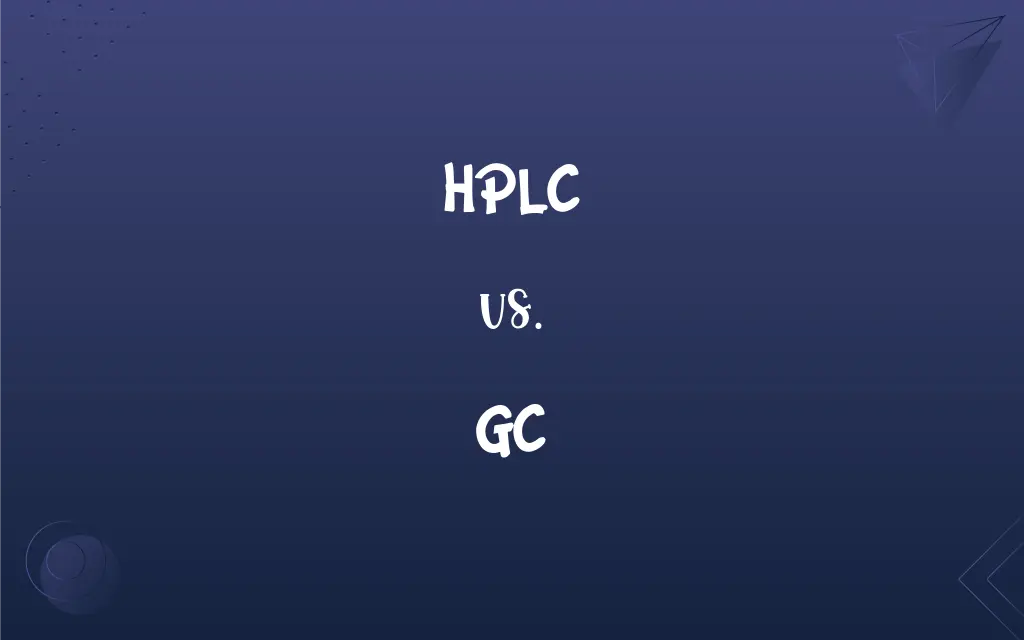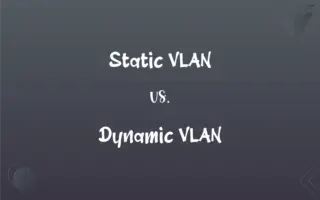HPLC vs. GC: What's the Difference?
Edited by Aimie Carlson || By Janet White || Published on March 4, 2024
HPLC separates compounds in liquid phase using high pressure, while GC separates volatile compounds in gas phase using temperature.

Key Differences
High Performance Liquid Chromatography (HPLC) and Gas Chromatography (GC) are both analytical techniques used to separate, identify, and quantify components within a mixture. HPLC operates in the liquid phase, where the sample is dissolved in a solvent and passed through a column under high pressure. GC, on the other hand, separates compounds based on their volatility and boiling points. Samples are vaporized and carried by an inert gas through a column. The components separate based on their interaction with the column's stationary phase and their boiling points.
HPLC uses liquid mobile phases and operates under high pressure to facilitate the separation of components, GC uses a gas as the mobile phase and separates compounds based on their volatility and interaction with a heated column. HPLC can analyze a broader range of compounds, including large, non-volatile molecules like proteins and polymers, whereas GC is more suited for small, volatile molecules.
Both HPLC and GC are equipped with a variety of detectors that can be selected based on the specific analysis requirements. HPLC detectors might include UV-visible, fluorescence, or mass spectrometric detectors, while GC commonly uses flame ionization or mass spectrometric detectors. The choice of detector is crucial for achieving the sensitivity and specificity needed for the analysis.
HPLC and GC are essential tools in analytical chemistry, each with its unique advantages and limitations. HPLC is preferred for complex mixtures of both volatile and non-volatile compounds, offering high resolution and versatility. GC is ideal for analyzing small, volatile compounds, providing fast analysis times and high sensitivity for certain applications.
Comparison Chart
Phase of Analysis
Liquid
Gas
ADVERTISEMENT
Separation Principle
Solubility, molecular size, and interactions
Volatility and boiling point
Sample Type
Volatile and non-volatile, large and small molecules
Primarily volatile, small molecules
Mobile Phase
Liquid solvent
Inert gas (e.g., helium, nitrogen)
Pressure
High pressure to push solvent through column
Low pressure, temperature controlled
Typical Applications
Pharmaceuticals, proteins, polymers
Petrochemicals, environmental monitoring, forensic science
ADVERTISEMENT
Detectors Used
UV-visible, fluorescence, mass spectrometry
Flame ionization, mass spectrometry
Temperature Control
Room temperature to moderate heating
High-temperature control for vaporization
Analysis Time
Moderate to long
Short to moderate
Sample Preparation
Minimal for soluble compounds
Often requires derivatization for non-volatile compounds
HPLC and GC Definitions
HPLC
It is versatile with various detectors for different analytes.
The UV detector in our HPLC setup efficiently detected the presence of the target compound.
GC
A technique for separating and analyzing compounds that can be vaporized without decomposition.
The lab used GC to analyze the chemical composition of the fragrance.
HPLC
HPLC is essential in pharmaceutical and biochemical research.
The new drug's composition was confirmed using HPLC techniques.
GC
A qualification in secondary education in some countries.
She received her GC in mathematics with high marks.
HPLC
HPLC can analyze both volatile and non-volatile compounds.
Our lab used HPLC to quantify the protein concentration in the sample.
GC
A club used to hit the ball in the game of golf.
He bought a new set of GCs to improve his game.
HPLC
HPLC is a chromatography technique for separating compounds in a liquid phase.
The HPLC system identified several impurities in the pharmaceutical sample.
GC
A large cell found in some tumors and inflammatory conditions.
The biopsy revealed the presence of GCs, indicating a possible giant cell tumor.
HPLC
It uses high pressure to push solvents through a column.
HPLC analysis requires precise pressure settings for optimal separation.
GC
The operations center that manages spacecraft during flight.
The astronaut communicated with GC for guidance on the mission.
GC
(internet) group chat
GC
1,000,000,000 periods per second
FAQs
What is HPLC?
High-Performance Liquid Chromatography (HPLC) is a technique used to separate, identify, and quantify components in a liquid mixture.
How does GC work?
GC works by vaporizing the sample and passing it through a long column with a stationary phase, separating the components based on their boiling points and affinity to the stationary phase.
How does HPLC work?
HPLC works by passing a pressurized liquid solvent containing the sample mixture through a column filled with a solid adsorbent material, separating the components based on their interactions with the adsorbent.
What are the detectors used in GC?
Common detectors in GC include flame ionization detectors (FID), thermal conductivity detectors (TCD), and mass spectrometers.
What is the difference between HPLC and GC?
The main difference is the phase of the mobile phase: HPLC uses a liquid, while GC uses a gas.
What is the stationary phase in GC?
The stationary phase in GC is a thin film of liquid or polymer coated on the inside of the column or on solid support particles.
What is GC?
Gas Chromatography (GC) is a method used to separate and analyze compounds that can be vaporized without decomposition.
What are the main applications of HPLC?
HPLC is widely used in pharmaceuticals, environmental testing, food analysis, and biochemical research.
What is gradient elution in HPLC?
Gradient elution is a technique in HPLC where the composition of the mobile phase is gradually changed during the separation process to improve resolution.
What is the role of the carrier gas in GC?
The carrier gas in GC transports the vaporized sample through the column and plays a role in the separation efficiency and detection sensitivity.
Can GC analyze liquids?
Yes, GC can analyze liquids, but the samples must be volatile or made volatile through derivatization.
What is a GC-MS?
GC-MS is a combination of gas chromatography and mass spectrometry, used for identifying and quantifying compounds in a sample.
What are some common solvents used in HPLC?
Common solvents used in HPLC include water, methanol, acetonitrile, and tetrahydrofuran.
What are the main applications of GC?
GC is commonly used in petrochemical analysis, environmental monitoring, forensic science, and food testing.
What are the detectors used in HPLC?
Common detectors in HPLC include UV-Vis detectors, fluorescence detectors, and mass spectrometers.
What is the stationary phase in HPLC?
The stationary phase in HPLC is usually a solid material, such as silica gel or polymer beads, packed in a column.
What is reverse-phase HPLC?
Reverse-phase HPLC is a type of HPLC where the stationary phase is nonpolar, and the mobile phase is polar, which is opposite to normal-phase HPLC.
What is the role of the solvent in HPLC?
The solvent in HPLC acts as the mobile phase, carrying the sample through the column and affecting the separation based on the polarity and solubility of the components.
Can HPLC analyze gases?
No, HPLC is not suitable for analyzing gases; it is designed for liquid samples.
What is temperature programming in GC?
Temperature programming in GC is a technique where the temperature of the column is gradually increased during the analysis to separate components with different boiling points.
About Author
Written by
Janet WhiteJanet White has been an esteemed writer and blogger for Difference Wiki. Holding a Master's degree in Science and Medical Journalism from the prestigious Boston University, she has consistently demonstrated her expertise and passion for her field. When she's not immersed in her work, Janet relishes her time exercising, delving into a good book, and cherishing moments with friends and family.
Edited by
Aimie CarlsonAimie Carlson, holding a master's degree in English literature, is a fervent English language enthusiast. She lends her writing talents to Difference Wiki, a prominent website that specializes in comparisons, offering readers insightful analyses that both captivate and inform.































































